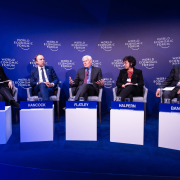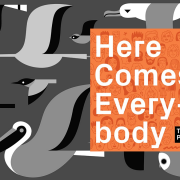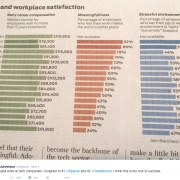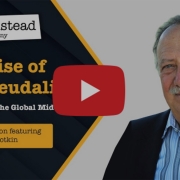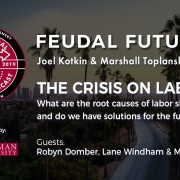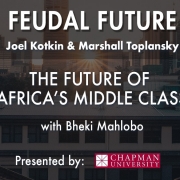Beyond Davos
Few annual events produce more paranoid commentary than the World Economic Forum’s recently completed Davos conference. The WEF, founded in 1971, has not only become the favored target of lunatic spinmeisters like Alex Jones and right-wing zealots like Glenn Beck but also of Fox News and many conservative activists. It is widely regarded as the place where a terrifying “Great Reset” has been plotted by the mighty—a plan hatched behind closed doors between sips of champagne and forays onto the slopes. The South African reporter Lara Logan even claimed (falsely) that the new Speaker of the House, Kevin McCarthy, was selected at Davos.
“WEF is a sitting target (of misinformation)—very expensive to attend, invitation only,” said Claire Wardle, co-director of the Information Futures Lab at Brown University. “It’s playing out the foundation of every conspiracy theory, which is that the world is being controlled by a secret elite and you’re not part of it.” But suspicions like these misunderstand the problem. A transformation of the world economy is occurring, but not because a bunch of elite business, political, and media folk preen on stage while enjoying Swiss comforts. Rather, the world is changing because the tectonic plates governing economics and politics have moved, and they are likely to continue moving.
The establishment avatar
The populist conspiracy theorists mistake showmanship for reality. Cambridge legal professor Antara Haldar notes that Davos is not really a place where important decisions are taken. It represents a symbolic “avatar” for the elites. If the Davos crowd has demonstrated anything, it is the futility of their posturing. They lack the ability to influence the leaders of countries like India and China, much less places like Iran, Russia, and Saudi Arabia. Some of the leaders of these countries may speak and consort with the Davos crowd, but they clearly do not listen to them. Nor do the West’s middle classes, who are proving reluctant to embrace an environmental agenda that threatens immiseration.
The WEF is unable to affect the global future outside the narrow confines of their own gilded circles. “On its face, Davos appears to be a meeting out of touch with the times, focused more on privilege than social change, economic displacement, or cross-cutting global challenges,” noted the Brookings Institution in 2020. Rather than an expression of real power, Davos reflects the continued rise of the publicity-mad business leader, first identified by Daniel Bell a half-century ago. Prior generations of business had embraced Western culture and national identity and placed some priority on addressing the needs of larger society. The new corporate elite, however, is unmoored from religion and family and this is transforming the foundations of middle-class culture.
More than anything, Davos demonstrates not power—it has no legislative or regulatory power—but the relentless search for prestige and recognition. It is no more real in its effects than a Kabuki play.
Aristocracy redux
The elites gathered at Davos may spout progressive ideas, but they actually represent something more like a return to the kind of hierarchy associated with feudalism. After nearly a half-century of expanded social mobility, Western economies have become increasingly stratified, with economic power concentrated in ever fewer hands. In the past decade, the proportion of US real estate wealth held by middle- and working-class owners fell substantially. “In 2010,” reports the Wall Street Journal, “high-income homeowners held 28% of all U.S. housing wealth. By 2020, that figure rose to 42.6%.” In the last decade, “about 71% of the increase in housing wealth was gained by high-income households, according to a report released Wednesday by the National Association of Realtors.”
This is a global phenomenon. Housing prices have risen “three times faster than household median income over the last two decades,” according to the OECD. And housing, it finds, “has been the main driver of rising middle-class expenditure.” In the next generation, those who purchase houses will be doing so through what one writer calls “the funnel of privilege.” Millennials who received bequests inherited more money than many workers make in a lifetime. “Inherited wealth will make a comeback,” predicts the economist Thomas Piketty in Capital in the Twenty-First Century. Inheritance as a share of GDP in France, he writes, grew from roughly four percent in 1950 to 15 percent in 2010. The growing importance of inherited assets is even more pronounced in Germany, Britain, and the United States.
These trends were evident long before anyone had ever heard of Klaus Schwab. What Davos does—for both the conspiracy nuts and the general public—is provide a garish stage for a bifurcated class structure. In the United States, in recent decades, wealth gains have been concentrated among the top 0.1 percent—roughly 150,000 people. Since the mid-1980s, the share of national wealth held by those below the top 10 percent has fallen by 12 percentage points, the same proportion that the top 0.1 percent gained. A British parliamentary study projects that, by 2030, the top one percent will expand their share to two-thirds of the world’s wealth, with the biggest gains overwhelmingly concentrated in the top 0.01 percent.
Read the rest of this piece at Quillette.
Joel Kotkin is the author of The Coming of Neo-Feudalism: A Warning to the Global Middle Class. He is the Roger Hobbs Presidential Fellow in Urban Futures at Chapman University and Executive Director for Urban Reform Institute. Learn more at joelkotkin.com and follow him on Twitter @joelkotkin.
Photo: Evangeline Shaw on Unsplash

